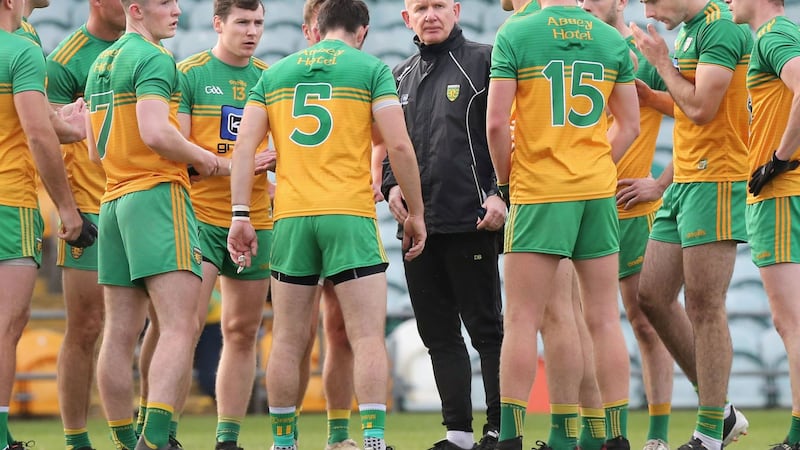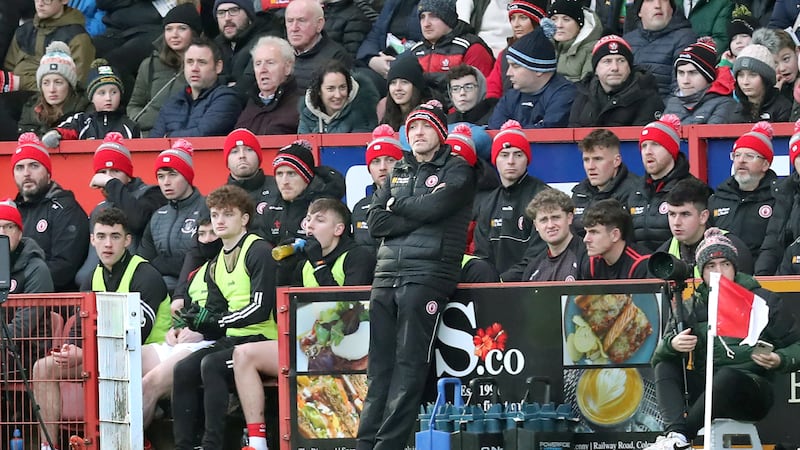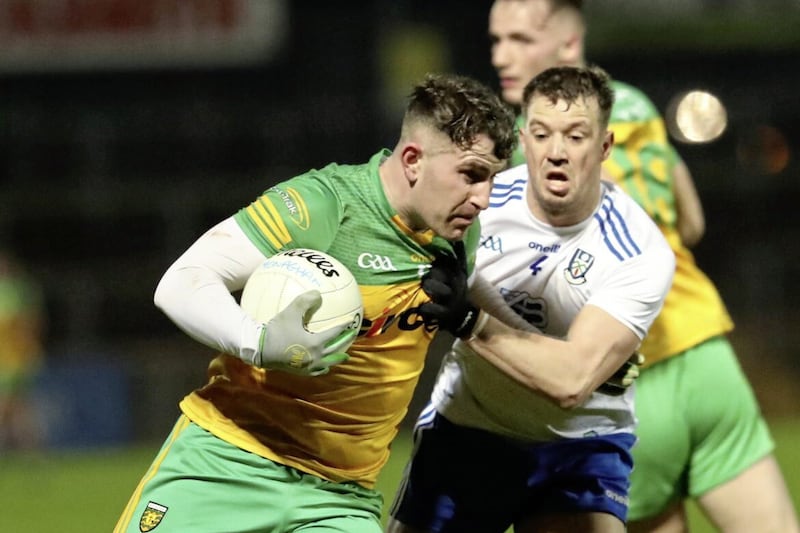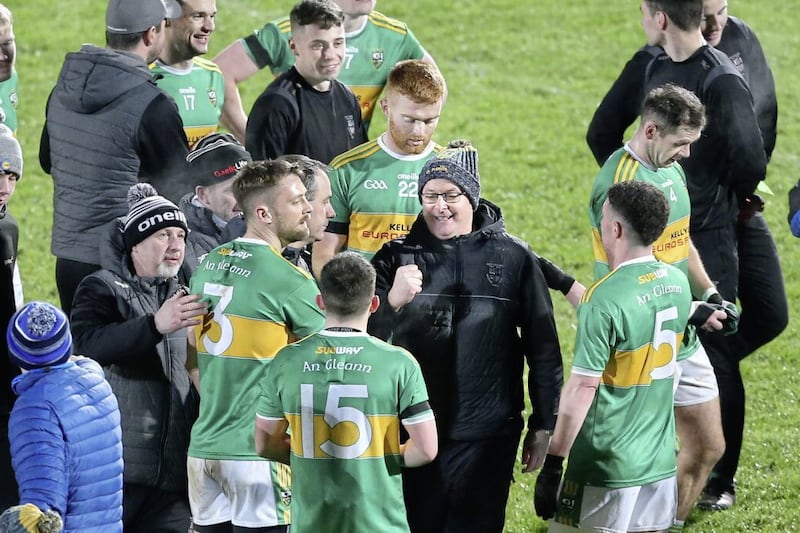I ASKED if he could send me a picture from his time at Celtic. Maybe a nice shot of him and the late Billy McNeill outside Parkhead?
“I don’t have any,” Declan Bonner replied.
That just about sums it up. As a teenager, the Donegal manager was promised a contract with the Hoops and when it fell through – because of circumstances beyond his control - he was left with nothing. Not even a photograph.
When he has a spare minute or two (which isn’t often), the 1992 All-Ireland winner and current Tir Chonaill manager must sometimes think of what might have been.
Born and bred in the Rosses in west Donegal, Bonner comes from staunch GAA stock. His father Dan lined out for his county and Gaelic Football was his passion. Soccer wasn’t encouraged and Declan didn’t play an organised game until he went to secondary school. Despite that, a few years later he was captain of the Republic of Ireland U17 team which included two-time World Cup striker Niall Quinn.
Celtic had just signed a Bonner from up the road in Burtonport. He was a goalkeeper called Patrick (Packie of course) and their scout probably couldn’t believe his luck when he came across Packie’s distant cousin, a red-haired bull of a left-back.
“I would have been over to Glasgow at two or three different stages,” Bonner explains.
“That Easter I had been over and then Billy McNeill called me in to say: ‘Yeah, we’ll give you a two-year contract and come back in for pre-season’.”
He had trained with a first team that included an array of household names including Charlie Nicholas, Danny McGrain, Paul McStay, Roy Aitken and Murdo MacLeod and, after McNeill gave him the good news, he went home to Donegal to finish school dreaming of a career as a professional footballer.
Unfortunately for him, everything unravelled when Celtic sold Nicholas to Arsenal against McNeill’s wishes. Angry and feeling undermined, ‘Caesar’ cleared his desk and resigned. He was confirmed as manager of Manchester City manager on June 30, 1983.
“I was doing the Leaving Cert and I got a call through to the school from Packie to say that McNeill had gone to Manchester City with his backroom team and that was it,” says Bonner matter-of-factly.
Davy Hay took over as manager but Bonner’s agreement was between him and McNeill, not him and Celtic. The call never came for pre-season training and the two-year contract never materialised.
“Once McNeill left there was no-one there,” says Bonner.
“There was nobody else there to say: ‘We will get you over’, that was just the way it was.”
HE could have been number 3 at Celtic, instead he became the number 13 for Donegal. Bonner was 18 when he was called into the Donegal senior squad after the 1983 Ulster final victory. Before then he’d played four seasons in the U21s which were sandwiched by All-Ireland titles at that level.
“I thought I was jinxed,” he says.
“In ’82, Donegal won the All-Ireland U21 and I played ’83, ’84, ’85 and ’86 and we won nothing and they won the All-Ireland again in ’87.”
So he had to bide his time and earn his success. His first Ulster medal came in 1990 when he scored two points and Donegal beat Armagh by one. The following year he was back at Clones but Donegal lost to a Down side that kicked-off a golden era for Ulster football as they went on to win the All-Ireland.
1992 was Donegal’s year and Bonner was at the forefront of their campaign. He provided a cutting edge in a team full of determined, skilful, artful dodgers. Bonner contributed 11 points in the three wins in Ulster, then four in the semi-final victory against Mayo and another four – two from play and two off his left boot from frees – as Donegal sank the Dubs in the final and brought the Sam Maguire back to the Hills for the first time. Glory days.
DONEGAL lost their Ulster title in 1993 and when they next made the provincial final – five years’ later – Bonner was their manager. The previous summer he had been injured in the semi-final loss to Cavan and called it a day. A month later on his 32nd birthday in August, he was appointed senior team manager.
He’d always been an intuitive reader of the game but his formal experience for the role amounted to a season as player-manager with his club after Tom Conaghan dropped him in 1989.
“I went to Boston in '88 for the summer after we got beat by Armagh in the first round of the Championship in the Athletic Grounds,” he explains.
“I was meant to come back for training but I maybe over-stayed my welcome for a number of weeks. By the time I came back, Tom had made a decision that I wasn't going to be in the squad.
“The club AGM was on that January. I might have been back playing with Finn Harps at the time but the club couldn't get a manager and I said I would take it on.”
He was 23. Na Rossa won their first ever Intermediate Championship and the following year Conaghan left Donegal, Brian McEniff came back and Bonner was recalled. Apart from that 1989 season, his other managerial experience was with soccer outfit Keadue Rovers.
“In 1996, I got my kidney damaged against Wicklow in Croke Park,” he recalls.
“I was out of football for a year. Tony (Boyle) had been on to me and I ended up managing Keadue for a year.
“We won the Donegal League and we got to the All-Ireland Junior semi-final but we lost 4-3 in Dublin in Clondalkin. My brother Sean was playing, Tony was playing, Tony's brother Ben was playing, Ollie Reid had come in. Liam Sweeney, who used to play for Harps, and Brendan Gillespie who played for Fanad. We had a serious team. Martin Doherty from Glenties was another. That was my only other managerial experience.
“Thinking back on it, I wonder: ‘How the hell did I do that?’” he adds with a smile.
“I was straight into it. The wife thought: ‘That's the football over now’ and I’d have more time around home. The children were all small at the time - I had one born in 1995, 1996 and 1998, so there were three babies in the house.”
There were kids at home but grown men in the dressingroom, some of whom he’d played alongside and he was confronted by difficult decisions over their futures at inter-county level.
“There were players older than me in the team - there were still a good number of the 1992 guys there,” he explains.
“That was never going to be easy because some of those players were coming towards the end.
“Some would have thought they could play for a bit longer and I had decisions to make that they weren't playing or whatever.
“Those decisions are never easy to make even to this day, and those decisions will have to be made again over the next week. That's part and parcel of it - you do what you think is right for the group and for the team. That's it.”
Despite his lack of experience, Bonner took Donegal to the Ulster final in his first season. His team dethroned Cavan (the reigning champions) in the semi-final and it looked like they’d come out on the right side of a low-scoring decider until a fella called Brolly scored a goal in the final minute and celebrated by blowing kisses to the Clones crowd.
“Yeah it rankles with Mr Brolly,” says Bonner.
“We led up till almost the 70th minute and then the late goal... Listen, no doubt it was a bitter pill to swallow. It took almost 20 years to put it right.”
At the end of the 2000 season, he stepped down and later went into club management. He led Gweedore to the Donegal senior title in 2006 and says he “fell into” the county scene again.
“My own lad (Christian) was playing,” he explained.
“Normally at U15 level, the county is split into southern and northern development groups. There were four from our club who had come up and they were involved and I was just basically dropping them off on a Saturday morning.
“Paddy Hegarty was on his own looking after thirty odd young lads so I went in the following week and that was it, and I ended up taking charge of them.
“I took the U16s the following year (2012). I had the U17s in 2013, the minors in 2014 and 2015, the U21s in 2016 and ’17 and then the seniors in 2018.”
And he has brought a host of the stars of the team that will line-out in Sunday’s Ulster final through the ranks with him. Stephen McMenamin, Brendan McCole, Eoghan 'Ban' Gallagher, Caolan McGonagle, Michael Langan, Jason McGee, Jamie Brennan, Niall O'Donnell, Daire Ó Baoill, Ethan O'Donnell… They’ve been working together for years.
“Most of them won at 16s, 17s, 18s, and 21s,” says Bonner.
“They’re coming into their prime now in terms of getting that leadership from them.”
They were only slips of lads when their manager had his first spell in charge of Donegal.
Q. What has changed since?
A. Everything.
“It’s huge,” he says.
“When I started even in terms of your backroom team it was small. You had two selectors, a trainer, one in the medical team. There was no in-depth analysis.
“Now you are managing a huge set-up. It’s completely different, night-and-day change in terms of everything. At the minute it feels like 24/7.
“Adrenalin keeps you going. It’s what I’ve been used to and it’s massive in terms of what goes into it. I’m lucky enough in the position I’m in that I can get the hours put into it but it needs those hours.
“It’s not something that you can go into and think you’re going to be there on a Tuesday, Thursday and Saturday doing X, Y and Z, it’s every day, seven days’ a week. I would safely say it’s 60-70 hours’ a week, no doubt.
“The players put in a huge amount of time and effort and management is not going to suit everyone because they won’t have the hours to put into it,” he adds.
“You can be the best manager, the best coach, the best whatever but unless you can put the time and energy into it it’s not going to work because players demand. They know the standards and they are high standards and any fall-off at all will be found out very quickly.
“So it has to be all-in, that’s just it.”
Celtic’s loss, Donegal’s gain.







